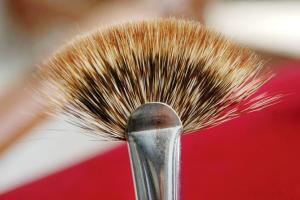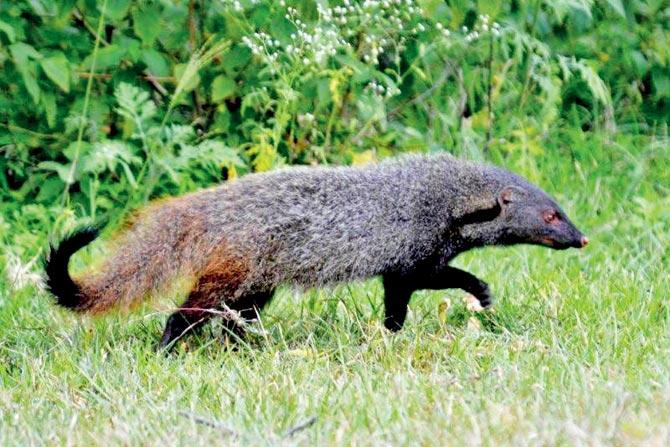Increasing demand for brushes made from the hair of the protected animal has put the species under threat; more than 3,500 brushes - used for painting - were seized in a recent raid

Mongoose hair is of a fine quality. It is long lasting, does not sag or lose shape, or go brittle over the years and does not absorb stains
Rudyard Kipling's Rikki-Tikki-Tavi is in danger. The species of animal he immortalised in the story, is under threat from poachers in India, due to the increasing demand for its hair/fur. In raids at 13 locations simultaneously by the Wildlife Crime Control Bureau (WCCB), state Forest Departments and Wildlife Trust of India (WTI), over 3,500 mongoose hair brushes – used mostly for painting - were seized on December 10.
A hairy tale
The members of NGO WTI, which has been consistently highlighting the illegal sale of wildlife, had gathered information from its network of volunteers across the country about the illegal sale of these hair brushes. The NGO shared the information with WCCB and Forest Departments (FD) of different states. The places where the raids were held include Himachal Pradesh, Rajasthan, West Bengal and Uttar Pradesh.
ADVERTISEMENT
Mongoose hair brushes are in demand due to the fine quality of hair. It is long lasting, does not sag or lose shape, or go brittle over the years and does not absorb stains.
Prerna Panwar, assistant manager, Wildlife Crime Control Division, who coordinated the operations said, "We were not looking for the number of brushes seized, but the links to manufacturers or suppliers, and also to figure out the widespread nature of the trade. The credit goes to WCCB and state FDs for this huge turmoil in the illegal brush making industry, and of course to WTI volunteers for providing this information."
According to experts, there are traditional hunting communities across the country, which hunt mongoose. These include Narikuruvas in Tamilnadu, Hakki Pakki in Karnataka, Gonds in Andhra and Karnataka, and Gulias, Seperas, Nath in central and northern India. They are the main suppliers of the fur to the business. The quantity of hair may vary from few grams to kilos, and the price range is between Rs 3,000-5,000 per kg. The hair is usually combed and sold in small bundles according to the length.
Smaller manufacturers reign
"Earlier these brushes were produced by many leading reputed brush manufacturers. The illegal nature of trade came to light in early 2000 and the major manufacturers stopped production of these brushes. The mongoose was upgraded into schedule II part II of the Wildlife (Protection) Act 1972 to ensure maximum punishment to anyone who deals in this illegal business. But the demand from buyers ensured that smaller manufacturers entered the business," said Jose Louies, Chief of Enforcement, Wildlife Trust of India.
"It is often a business where all members of the family are involved, as the infrastructure requirement for the making units is little. These brushes are distributed with or without handles from manufacturing units. Export quality brushes are sold without the handle as the resellers attach branded handles to them. This creates anonymity of the trade network using various brand names," added Louies.
Experts say that to confuse customers, these brushes are often labelled Indian Sable, Kolinsky, badger, pony, Kevrin or acrylic hair brushes. In the international market these brushes are known as 'kevrin' brushes and they are sold online across the globe.
Girish HV, Conservator of Forest, Wildlife and Crime Research, Uttar Pradesh FD said the raids show that we need to focus on lesser known species too, for wildlife protection. "India is the one of the largest exporters of brushes made by killing thousands of mongooses annually. The trade is rarely highlighted, as the focus remains on the larger mammals instead of lesser known species. We will keep looking for all possible hotspots," he said.
He also said that this seizure was not as big as the seizures recently done at Sherkot, Uttar Pradesh, but they also indicate the demand and widespread trade of brushes. "Do we really need to use these blood-stained brushes that can cause these species to go extinct, when there are alternatives available? We cannot afford to lose our wildlife to lack of awareness, or apathy, and tackling this requires concerted effort," he added.
Who is the buyer
Experts say the demand for these brushes by artists within and outside the country is the main challenge. People buy them because of the fine quality, and fine art college teachers too, unknowingly recommend them to their students, and none of them are aware about the illegal nature of these brushes. Reduction of the demand from buyers across the world is the only way to stop this trade.

A stripe-necked mongoose
More on the mongoose
Mongoose are wild animals listed under schedule II part II of the Wildlife (Protection) Act, 1972 and their hunting, possession, transportation and trade is an offence u/s 9, 39, 40, 48-A and 49-B, punishable u/s 51 of the Act. A total of six different species are found across the country and they are often sighted on farm lands and in forest areas.
Catch up on all the latest Mumbai news, crime news, current affairs, and also a complete guide on Mumbai from food to things to do and events across the city here. Also download the new mid-day Android and iOS apps to get latest updates
 Subscribe today by clicking the link and stay updated with the latest news!" Click here!
Subscribe today by clicking the link and stay updated with the latest news!" Click here!







